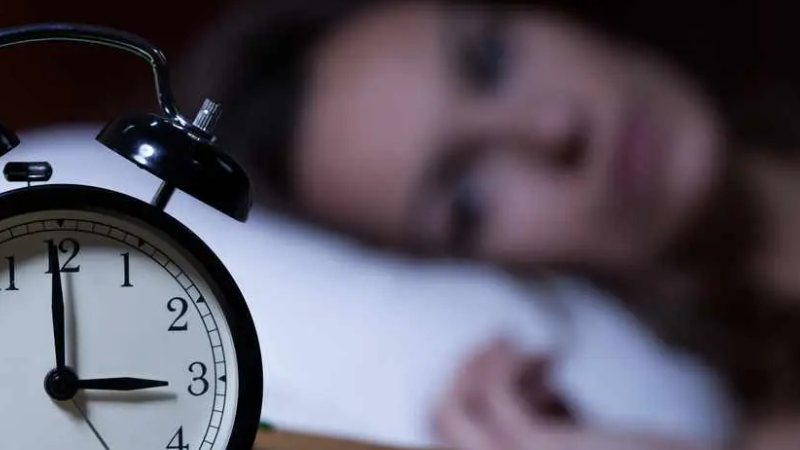Insomnia manifests as a sleep disorder characterised by difficulties falling asleep or maintaining sleep. It is classified into two categories such as insomnia lasting for shorter period and one which lasts for longer period. Various factors, such as genetics, medical conditions, mental health conditions, hormonal changes, life situations, and habits, can contribute to its onset. Predominantly, insomnia affects women more frequently than men, with hormonal shifts like those during premenopause or post-menopause being potential contributors. Post-menopause, defined as the absence of menstruation for 12 consecutive months, marks a phase where women undergo hormonal changes that can lead to various physical and psychological symptoms. These symptoms may include hot flushes, night sweats, mood swings, anxiety, stress, forgetfulness, and disruptions in sleep patterns. The primary cause of insomnia in post-menopausal women is attributed to fluctuations in reproductive hormones, particularly a decrease in estrogen(estradiol) levels. Menopause is recognised for its association with changes in behaviour, mood swings, anxiety, stress, forgetfulness, and sleep disturbances.
Sleep difficulties in midlife women are complex and influenced by multiple factors. They are closely linked to hormonal fluctuations and depression, along with other aspects associated with aging into midlife such as stress, declining health, and persistent pain due to medical conditions.
According to research conducted by the Study of Women’s Health across the Nation (SWAN), the frequency of sleep disturbances increases with age. The prevalence of this in premenopausal women is 16% to 42%, and in postmenopausal women, it is 35% to 60%.
As sex hormones play a role in regulating sleep, the decrease in ovarian function during postmenopause heightens the vulnerability of women to experience sleep disturbances and disorders, including diminished sleep quality, inadequate sleep duration, obstructive sleep apnea (OSA), restless legs syndrome, and insomnia. Research indicates that sleep disorders, particularly insomnia and OSA, are more prevalent in postmenopausal women. Specifically, OSA has been linked to cognitive deficits in attention, memory, executive function, psychomotor skills, visuospatial abilities, and language skills, while insomnia primarily affects attention, memory, and executive function.
Decreased estrogen(estradiol) levels in postmenopausal women may lead to vasomotor symptoms commonly known as ‘hot flashes’ or ‘hot flushes. These symptoms involve sudden feelings of intense heat accompanied by a rapid heartbeat, typically lasting less than 30 minutes per episode. Experiencing these symptoms, especially at night, can contribute to insomnia among postmenopausal women. The duration of insomnia during and after menopause varies for each individual and depends on numerous factors.
Insomnia can increase the risk of anxiety, depression, hypertension, and obesity in postmenopausal women. Each individual’s experience with menopause varies. For some, symptoms may persist for a longer duration compared to others. During the initial 1–6 years of early postmenopause, estradiol levels continue to decrease, potentially prolonging symptoms.
Non-drug therapy for insomnia includes exercises, yoga, meditation, the avoidance of caffeine and alcohol, aromatherapy,hypnosis, etc. Smoking and consuming large amounts of caffeine and alcohol can negatively affect sleep quality. To enhance sleep quality, it is advised for individuals to minimize or refrain from consuming these substances, particularly during the afternoon and evening hours. Aromatherapy might aid in relaxation and decrease hot flashes. Participating in yoga during menopause can have a beneficial effect on psychological symptoms. For those facing sleep disruptions due to stress or anxiety, practicing yoga could help alleviate these issues. Exercise can greatly influence both physical and mental well-being during menopause.
Understanding the complex interplay between menopause and insomnia is essential for providing comprehensive care and support to women during this transformative stage of life. Health care workers can support and empower women by offering comprehensive support that addresses physical, emotional, and lifestyle factors contributing to insomnia during menopause, enabling them to navigate through this phase with greater ease and improve their quality of life.
REFERENCES
Baker, F. C., de Zambotti, M., Colrain, I. M., & Bei, B. (2018). Sleep problems during the menopausal transition: Prevalence, impact, and management challenges. Nature and Science of Sleep, 10, 73–95. https://doi.org/10.2147/NSS.S125807
Jehan, S., Masters-Isarilov, A., Salifu, I., Zizi, F., Jean-Louis, G., Pandi-Perumal, S. R., Gupta, R., Brzezinski, A., & McFarlane, S. I. (2015). Sleep Disorders in Postmenopausal Women. Journal of Sleep Disorders & Therapy, 4(5), 212.
Krystal, A. D. (2003). Insomnia in women. Clinical Cornerstone, 5(3), 41–50. https://doi.org/10.1016/S1098-3597(03)90034-2
Menopause and insomnia: Link, duration, and remedies. (2021, September 29). https://www.medicalnewstoday.com/articles/menopause-and-insomnia
Shieu, M. M., Braley, T. J., Becker, J., & Dunietz, G. L. (2023). The Interplay Among Natural Menopause, Insomnia, and Cognitive Health: A Population-Based Study. Nature and Science of Sleep, 15, 39–48. https://doi.org/10.2147/NSS.S398019
About the Author: Sangeetha M is MPH Scholar at Edward & Cynthia Institute of Public Health – Advanced Technical Cooperation Center with Yenepoya ( DU).
Disclaimer: Views expressed are the author’s own. Edward & Cynthia Institute of Public Health or Yenepoya (Deemed to be University) are not responsible for contents or opinions reflected in this article.
Sangeetha M
-
Sangeetha M#molongui-disabled-link
-
Sangeetha M#molongui-disabled-link
-
Sangeetha M#molongui-disabled-link




